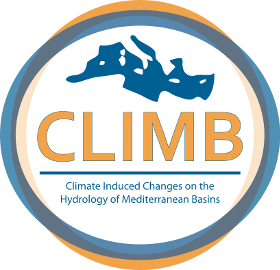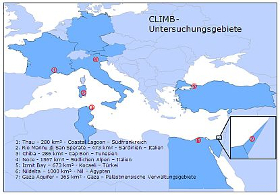
CLIMB

Project „Climate Induced Changes on the Hydrology of Mediterranean Basins“
Funded under the Seventh Framework Programme (FP7) of the European Commission, the environmental project CLIMB investigates the impacts of climate induced change on the hydrology and the management of water resources in the Mediterranean region (Southern Europe, North Africa, Near and Middle East). Protection of local water resources is seriously threatened: severe droughts, floods, the salinization of coastal groundwater and increasing land degradation of fertile soils are just some of the risks by which the progressive climate change will give rise to an increasing potential for tensions and conflicts among the political and economic actors in this vulnerable region. Therefore, existing water resources must be used and managed in a sustainable way. Current projections of future hydrological change, based on regional climate model results and subsequent hydrological modeling schemes, are very uncertain and poorly validated. The strategy of CLIMB is to reduce uncertainty and to quantify risk through an integrated monitoring and modeling system.
Beside CLIMB (www.climb-fp7.eu) the European Commission has initiated two other thematically related projects. From the Environment (incl. climate change) area the WASSERMed-project (Water Availability and Security in Southern Europe and the Mediterranean) and from the Socio-Economic Sciences and Humanities the CLICO-project (Climate Change, Hydro-Conflicts and Human Security) are forming a research cluster with CLIMB on climate change, water and security aspects. This interdisciplinary approach should foster core competences to provide an integrated perspective on the natural, social and economic impacts of climate change. Thus, the thematic cluster on "Climate Change Impacts on Water and Security in the Mediterranean" comprises 44 institutions from 19 different countries.
Project Overview
Objectives
- Analysis of the impacts of climate change on water resources in the Mediterranean region
- Iterative reduction of uncertainty in projections for the hydrological budget and extremes in the Mediterranean
- Implementation of research in seven selected study sites around the Mediterranean sea (France, Italy, Turkey, Tunisia, Egypt, and the Palestinian administrative areas)
- Characterization of the study sites, collection and access to geophysical and remote sensing data
- Integration of advanced field monitoring techniques, remote sensing analyses and retrievals, climate models auditing and integrated hydrologic modeling
- Socioeconomic factor assessment and integration into a new conceptual framework
- Development of a GIS-integrated risk assessment tool for adaptive water resource management
- Integration of CLIMB results in the regional water and agricultural management structure of the Mediterranean partner countries
- Continuous preparation of scientific results for political actors and relevant decision makers (policy briefing).
Target group
The project results from CLIMB are relevant to the following actors:
- The scientific community in the areas of hydrology, remote sensing, climate change and socio-economic sectors such as agriculture and tourism
- Actors in the field of water and agricultural management in the Mediterranean region
- Policy- and decision makers
- Interested public
In this period, CLIMB will disseminate its findings through a comprehensive website, scientific conferences and publications, application-oriented publications, regular press releases, workshops and targeted policy briefings.
BayFOR as partner
Prof. Ralf Ludwig (Department of Geography at the Ludwig-Maximilians-University of Munich, LMU) is the coordinator of CLIMB. Dr. Thomas Ammerl (Scientific Officer of Environment and Energy, BayFOR) is responsible for the project management (contract negotiations with the European Commission, compliance with contractual requirements, financial and organizational management, and organization of internal and external project communication).
Additionally, BayFOR actively supports the dissemination of scientific results of the CLIMB project (e.g. organisation of scientific conferences and local information events).
Within the frame of the cluster between CLIMB and the other FP7-projects (WASSERMed, CLICO) and the representatives of the European Commission, BayFOR ensures overall cross-project communication.
Funding period
CLIMB was funded for a 4-year run-time (1st January 2010 - 31st December 2013) under the Seventh Framework Programme (FP7) of the European Commission (EC contribution: 3.15 million euros).
Within the specific programme "Cooperation", the topic was part of the thematic priority "Environment (incl. climate change)”.
Consortium
The CLIMB consortium is constituted by a total of nineteen partners, comprising four European Member States (Austria, Germany, Italy, and France), four SICA countries (Egypt, Palestinian-administered areas, Tunisia, and Turkey) and one non EU member state (Canada). It includes universities, research institutions, one SME (small and medium sized enterprise) and a non-profit private entity. The four Bavarian partners are the Ludwig-Maximilians-Universität, Munich (LMU), the German Aerospace Center (DLR), the SME VISTA and the Bavarian Research Alliance (BayFOR). The Bavarian partners together receive a total EC contribution of € 1.1 million.
The cooperation between numerous European institutions within CLIMB and the cluster projects adds value to the European climate change research and adaptation community. Moreover, the integration of project partners from third partner countries (Egypt, Palestinian administrative areas, Tunisia, and Turkey) and Canada as a non-European country promotes scientific exchange, knowledge transfer and human capacity building between the European research area and these countries.
The participating partner institutions are (according to their numbering in the consortium):
Ludwig-Maximilians-Universität München, Germany, Project Coordination
AGRIS Sardegna - Agenzia per la Ricerca de la Agricoltura, Italy
Christian-Albrechts-Universität zu Kiel, Germany
Centre national du Machinisme Agricole, du Genie Rural, des Eaux et des Forets, France (Further information can be found here.)
Centre de Recherche et des Technologies des Eaux, Tunisia
Consorzio Interuniversitario Nazionale per la Fisica delle Atmosfere e delle Idrosfere, (Università di: Cagliari, Camerino, Bologna, Tor-Vergata Roma), Italy
Centro di Ricerca, Sviluppo e Studi Superiori in Sardegna, Italy
German Aerospace Center, Germany
Forschungszentrum Jülich GmbH, Germany
Gebze Institute of Technology, Turkey
Institut National de la Recherche Scientifique, Canada
Joanneum Research Forschungsgesellschaft mbH, Austria
Université d’Angers, France
Islamic University of Gaza, Palestinian administered areas
Università degli Studi di Padova, Italy
Università degli Studi di Trento, Italy
Zagazig University, Egypt
VISTA Geowissenschaftliche Fernerkundung GmbH, Germany
Bavarian Research Alliance, Germany
Further information
Further information can be found on:
7th Framework Program of the European Commission
German portal to the FP7
European Water Framework Directive
European adaptation to climate change
EU-Africa strategy
CLIWASEC brochure in English
CLIWASEC brochure in German
CLIWASEC brochure in French
CLIWASEC brochure in Italian
CLIWASEC brochure in Spanish
Video: "Voyage in the blue“ (GEOSS - English)
Your contact at BayFOR

Dr. Thomas Ammerl
Head of Unit Environment, Energy & Bioeconomy
Phone: +49 89 9901888-120
Email: ammerl@no-spam-pleasebayfor.org





